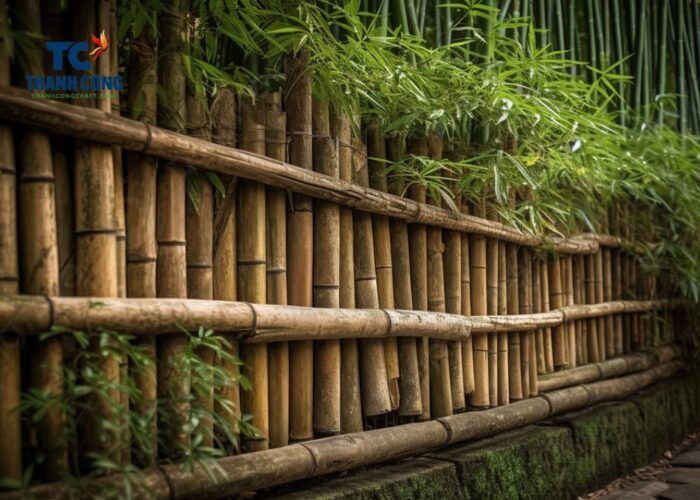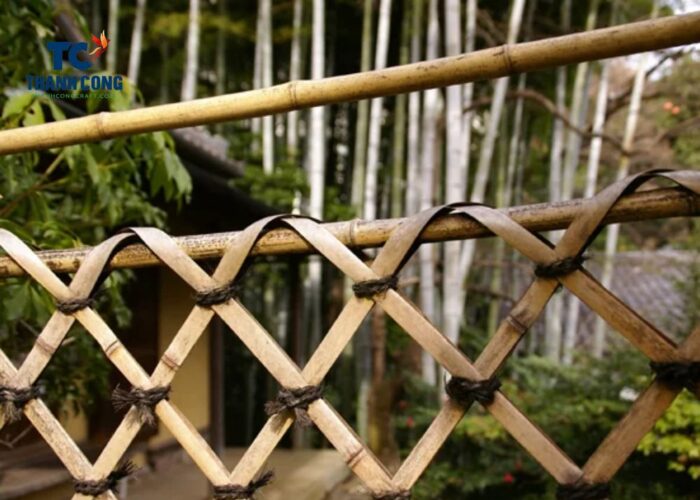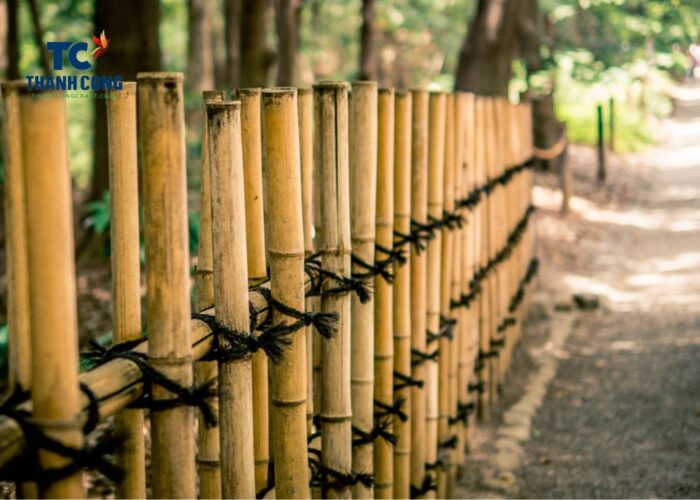Bamboo, a green, durable, and environmentally friendly material, finds wide applications, including in the construction of fences. Yet, a common query arises: How long does a bamboo fence last, and what measures can be taken to ensure their longevity?
This article aims to provide a detailed and comprehensive answer to this question. Have a read!
Contents
1. How long does a bamboo fence last?
When properly maintained, sealed, and stained, bamboo fencing can endure for up to 20 years, providing a high-quality, durable, and cost-effective fencing solution.
Is a bamboo fence waterproof? Bamboo fence is not inherently waterproof, as bamboo is a natural material that can absorb water. However, you can seal bamboo fencing with varnish or sealant or rubbing it with linseed oil to make bamboo more water-resistant or waterproof to some extent.
Some fencing materials, like wood and chain-link, are prone to issues such as rust, wear, chipping, peeling, and loss of luster. Bamboo, on the other hand, offers an investment in a material known for its exceptional durability and resistance to wear and tear.
In fact, bamboo stands out as one of the most robust natural materials, boasting remarkable resistance to environmental stressors.

While outdoor bamboo fencing may naturally experience some elemental wear over time, including exposure to wind, weather, sun, extreme temperatures, and storms, proper care can significantly extend its lifespan. Regular cleaning and staining every two to three years help reinforce and restore the bamboo fence, ensuring it maintains a fantastic appearance and performs well for an extended period.
It’s noteworthy that indoor bamboo fencing, shielded from direct exposure to the elements, may enjoy an even longer lifespan. With consistent maintenance through cleaning, staining, and sealing every two years or so, indoor bamboo fencing can remain in excellent condition for years beyond typical outdoor fencing.
2. How can I make my bamboo fence last longer?
Bamboo is a durable and environmentally friendly material, but it also needs protection from weather elements and harmful organisms. To prolong the lifespan of your bamboo fence, consider the following steps:
- Choose high-quality bamboo that is free from cracks or warping and has low moisture content.
- Seal, paint or apply a protective coating that is water-resistant, resistant to pests, and provides UV protection to the bamboo surface. This should be done before installing the fence and repeated annually or biennially.
- Install the bamboo fence at least 5 cm above the ground to avoid contact with moisture and bacteria. You can use wooden, stone, or metal supports to lift the fence.
- Trim excess or damaged bamboo branches and keep the fence clean by regularly sweeping away dirt and dry leaves.
- Periodically inspect the bamboo fence for early signs of damage, such as cracks, discoloration, or pest infestation. If identified, replace the affected bamboo poles immediately.

3. What are the disadvantages of bamboo fence?
Bamboo is susceptible to weather conditions and insect infestations, posing challenges for its maintenance and longevity. Exposure to high temperatures, humidity, and sunlight can lead to issues such as cracking, warping, and rot. Additionally, bamboo is vulnerable to pests like termites, ants, and rats. Protecting bamboo from these factors requires regular painting, coating, or treatment, incurring additional expenses and effort.
Maintenance and repair of bamboo can be challenging due to its natural, non-uniform composition and difficulty in cutting or drilling. Installing bamboo fences demands specialized tools and skills, necessitating professional assistance. In case of breakage or damage, individual bamboo sticks are hard to replace, often requiring the replacement of entire sections or the entire fence.
Bamboo is a fast-growing and spreading plant, which can cause nuisance to the surrounding areas. If you cannot control the growth of bamboo, it can invade the land of neighbors or cause environmental pollution.
4. Does bamboo rot when wet?
Yes, bamboo has the tendency to rot when consistently exposed to moisture because bamboo is not waterproof. While bamboo is naturally resistant to rot and decay to some extent, prolonged exposure to water or high humidity can lead to its deterioration.
To prevent rot, it’s essential to apply protective coatings, keep bamboo elevated above ground to avoid direct contact with moisture, and ensure proper drainage in areas where bamboo is used.
Regular maintenance, such as cleaning and inspecting for signs of decay, is also important to extend the lifespan of bamboo and prevent rot when wet.

5. How to treat bamboo fences?
Treating bamboo fences is essential to ensure their longevity and resilience against environmental elements. Begin by cleaning the bamboo surface thoroughly to remove any dirt or debris. Regular inspections should be conducted to identify and address signs of damage, such as cracks or discoloration.
To provide a protective barrier, apply a water-resistant coating that offers UV protection and resistance to pests. This coating should be reapplied annually or as needed. Sealing the bamboo is crucial to enhance its moisture resistance and reduce the risk of rot. Regular staining can be considered for those who prefer a specific color or want to maintain the natural hue of the bamboo.
During installation, elevate the bamboo fence at least 5 cm above the ground to prevent direct contact with moisture and potential decay. This measure is particularly effective in preserving the structural integrity of the bamboo.
Implementing a routine maintenance schedule is crucial. Regular cleaning, reapplication of protective coatings, and addressing any pest issues promptly contribute to the overall health of the bamboo fence. These efforts collectively ensure that the bamboo fence remains not only durable and structurally sound but also visually appealing in outdoor spaces.
In conclusion, the question of “how long does a bamboo fence last” is not one-size-fits-all. Instead, it depends on a combination of factors such as the type of bamboo, treatment and maintenance, climate, and installation quality.
If you have any further questions, don’t hesitate to send thanhcongcraft an email us at [email protected] or message us at WhatsApp: +84967485411. Hope to serve you soon! Best regard!


